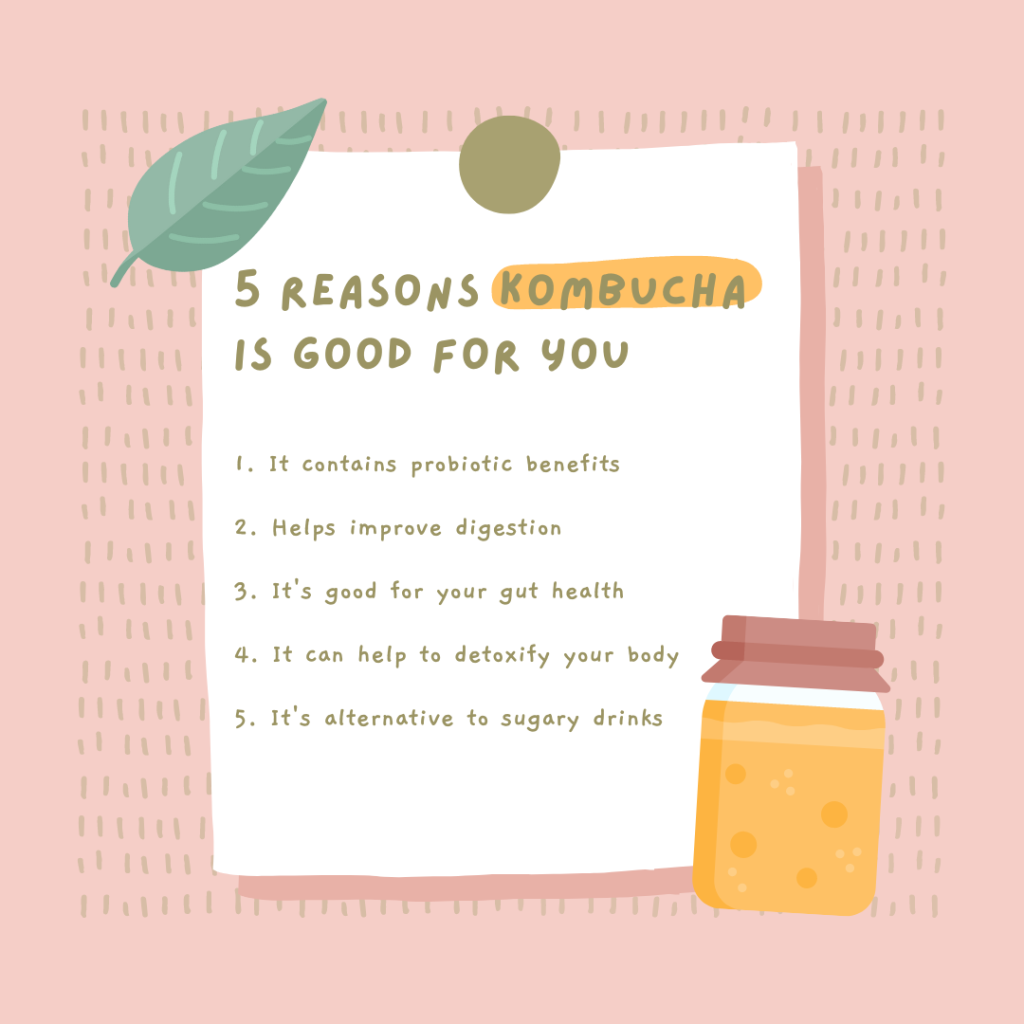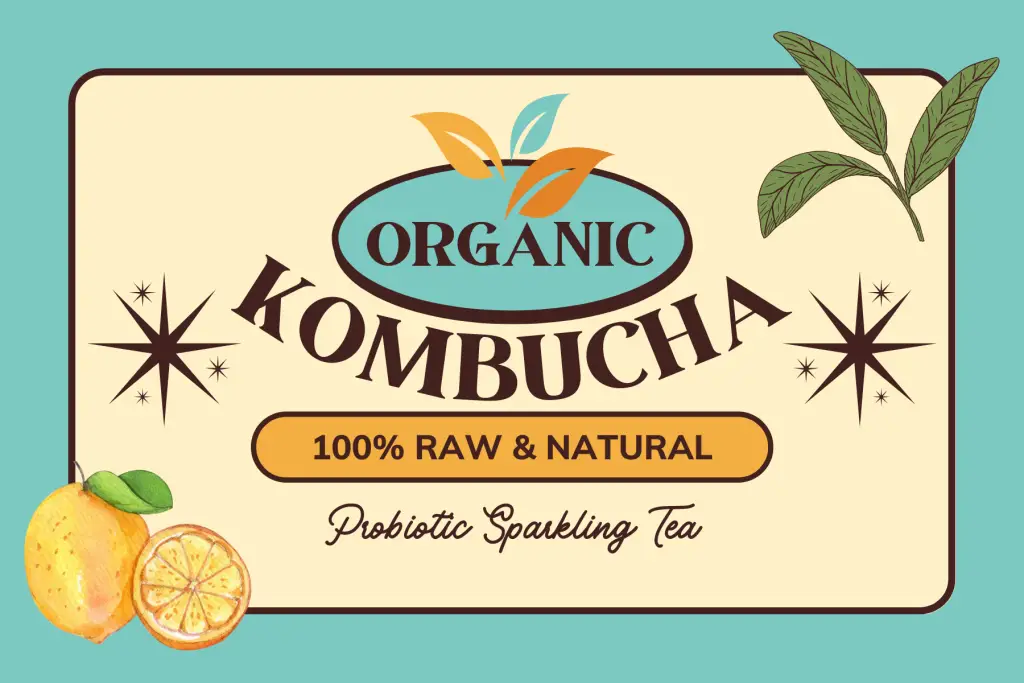Introduction:
Looking for a delicious and health-packed drink that can boost your well-being?
Look no further than kombucha! This fizzy, fermented tea has been gaining popularity for all the right reasons.
Packed with probiotics, vitamins, and other essential nutrients, kombucha is more than just a tasty beverage; it’s a super drink with a myriad of benefits for your body and mind.
In this article, we’ll explore 21 incredible reasons why you should make kombucha a part of your daily routine.
What is Kombucha
Kombucha is a unique and refreshing drink that’s becoming quite popular these days.
It’s a fizzy, fermented tea that’s not only delicious, but also packs a bunch of health benefits.
How is Kombucha Made
Here’s how it’s made: First, black or green tea is mixed with sugar, and then it’s left to ferment with the help of a “symbiotic culture of bacteria and yeast” (often called a SCOBY).
This SCOBY works its magic by converting the sugar into beneficial organic acids, vitamins, and probiotics.
The result is a tangy and slightly sweet drink with a delightful fizziness that can be flavored in various ways, such as with fruits or herbs.
It’s a fun and healthy alternative to sugary sodas or energy drinks.
People love kombucha not only for its taste, but also because it’s good for your gut.

The probiotics in kombucha promote a healthy balance of beneficial bacteria in your digestive system, which can improve digestion and boost your immune system.
Additionally, kombucha is rich in antioxidants that help protect your cells from damage caused by harmful molecules called free radicals.
These antioxidants contribute to better overall health and may even reduce the risk of certain diseases.
Related Articles
Motherwort Benefits
Bitter Melon for Diabetics
Some fans of kombucha also believe that it can aid in detoxification, support joint health, improve skin condition, and boost energy levels.
While more research is needed to fully understand all of its potential benefits, many people enjoy drinking kombucha as part of a healthy lifestyle.
Whether you buy it from a store or make it at home, kombucha is a tasty and revitalizing drink that’s both good for you and a pleasure to enjoy.
So, if you haven’t tried it yet, why not give it a sip and see what the buzz is all about!

21 Benefits of Kombucha
- Improved Digestion: Kombucha contains living probiotics that support a healthy gut environment. These beneficial bacteria help break down food and improve nutrient absorption, leading to better digestion and reduced digestive issues like bloating and indigestion.
- Enhanced Immune System: A robust gut microbiome is closely linked to a strong immune system. Kombucha’s probiotics stimulate the production of immune cells, providing better protection against harmful pathogens and reducing the risk of infections.
- Natural Detoxification: Kombucha is rich in enzymes and organic acids that aid the liver in its detoxification process. By assisting the liver in breaking down and eliminating toxins, kombucha contributes to a healthier body and improved overall well-being.
- Rich in Antioxidants: Antioxidants found in kombucha, such as polyphenols and flavonoids, scavenge free radicals in the body. This helps prevent cell damage, reduces oxidative stress, and lowers the risk of chronic diseases, including heart disease and cancer.
- Improved Joint Health: Glucosamines present in kombucha support the maintenance of healthy joint cartilage, reducing joint pain and inflammation. Regular consumption may lead to improved joint mobility and a lower risk of developing arthritis.
- Weight Management: As a low-calorie and low-sugar beverage, kombucha is an excellent alternative to sugary drinks. Additionally, its metabolism-boosting B-vitamins help in burning calories more efficiently, aiding in weight management.
- Increased Energy Levels: B-vitamins, especially vitamin B12, play a crucial role in energy production. Drinking kombucha can give you a natural energy boost without the harmful effects of caffeine or excessive sugars.
- Enhanced Mood: The gut-brain connection is significant, and kombucha’s probiotics may positively influence brain health. A healthy gut can contribute to better mental health, reducing the risk of anxiety and depression.
- Improved Skin Health: Antioxidants in kombucha protect the skin from damage caused by free radicals and UV rays. The probiotics also contribute to a balanced complexion and may help combat acne, resulting in healthier, radiant skin.
- Stronger Hair: Silica, a trace mineral found in kombucha, is known for promoting hair health. Regular consumption of kombucha may lead to stronger, shinier hair and reduced hair breakage.
- Better Sleep Quality: Some people experience improved sleep patterns after consuming kombucha due to its calming effect on the nervous system. Better sleep can lead to overall improved health and well-being.
- Cardiovascular Support: Certain compounds in kombucha, like catechins, have been associated with heart health benefits. By lowering cholesterol levels and supporting blood vessel function, kombucha may contribute to a healthier cardiovascular system.
- Diabetes Management: Initial research suggests that kombucha may help regulate blood sugar levels and improve insulin sensitivity. However, people with diabetes should consult their healthcare provider before incorporating kombucha into their diet.
- Enhanced Liver Function: Kombucha’s detoxifying properties can help the liver function optimally by aiding in the removal of toxins and promoting overall liver health.
- Alleviation of Allergy Symptoms: Kombucha’s quercetin content has anti-inflammatory properties that may help alleviate allergy symptoms, such as sneezing and itching.
- Reduced Risk of Cancer: Although more research is needed, kombucha’s antioxidant content shows promise in inhibiting the growth of cancer cells and reducing the risk of certain cancers.
- Stronger Immune Support During Pregnancy: The immune-boosting properties of kombucha may benefit pregnant women, but it’s essential to consult a healthcare professional before consuming it during pregnancy.
- Improved Oral Health: The acetic acid in kombucha has been shown to combat harmful bacteria in the mouth, promoting better oral health and reducing the risk of cavities and gum disease.
- Post-Workout Recovery: Kombucha’s electrolyte content, including potassium and sodium, can aid in replenishing lost nutrients after physical exercise, helping to reduce muscle soreness and fatigue.
- Enhanced Focus and Concentration: B-vitamins and other nutrients in kombucha play a role in cognitive function, potentially improving focus, memory, and overall brain health.
- A Tasty, Low-Sugar Beverage Option: Kombucha’s natural sweetness and low sugar content make it a refreshing and healthier choice compared to many sugary beverages. Its delicious taste and fizzy nature make it an enjoyable and guilt-free treat.

Side Effects
While kombucha is generally safe for most people when consumed in moderation, it’s essential to be aware of potential side effects, especially in certain situations or for specific individuals. Here are some of the possible side effects of kombucha:
- Digestive Issues: Kombucha contains live bacteria and yeast, which can sometimes lead to digestive discomfort, gas, or bloating, particularly in individuals with sensitive digestive systems.
- Allergic Reactions: Some people may be allergic to certain components of kombucha, such as the tea or added flavors. Allergic reactions may manifest as skin rashes, itching, or difficulty breathing.
- Caffeine Sensitivity: Kombucha is made from tea, which contains caffeine. People who are sensitive to caffeine may experience jitteriness, rapid heart rate, or difficulty sleeping if they consume large amounts of kombucha.
- Acidic Content: Kombucha is acidic due to the organic acids produced during fermentation. Excessive consumption may irritate the stomach lining, potentially causing acid reflux or heartburn.
- Pregnancy Concerns: Pregnant women are advised to exercise caution when consuming kombucha due to its live cultures and possible alcohol content. It’s best to consult with a healthcare professional before including it in their diet.
- Contamination Risks: When preparing kombucha at home, there is a risk of contamination if proper hygiene and brewing practices are not followed. Contaminated kombucha can lead to food poisoning or other health issues.
To minimize potential side effects, consider the following tips:
- Start with small amounts: If you’re trying kombucha for the first time or have a sensitive stomach, begin with a small serving to gauge your tolerance.
- Choose commercially prepared kombucha: Store-bought kombucha is usually pasteurized and regulated for alcohol content, reducing the risks associated with homemade varieties.
- Monitor your body’s response: Pay attention to how your body reacts to kombucha. If you notice any adverse effects, discontinue consumption and consult a healthcare professional if necessary.
Conclusion
As with any dietary change or new food or beverage, it’s always a good idea to listen to your body and consume kombucha in moderation. If you have any underlying health conditions or concerns, consult a healthcare provider before adding kombucha to your diet.
Incorporating kombucha into your daily routine can unlock these remarkable benefits and contribute to a healthier and happier you. Remember to enjoy kombucha in moderation, and if you have any specific health concerns or conditions, consult your healthcare professional before making it a regular part of your diet. Cheers to good health with kombucha!


